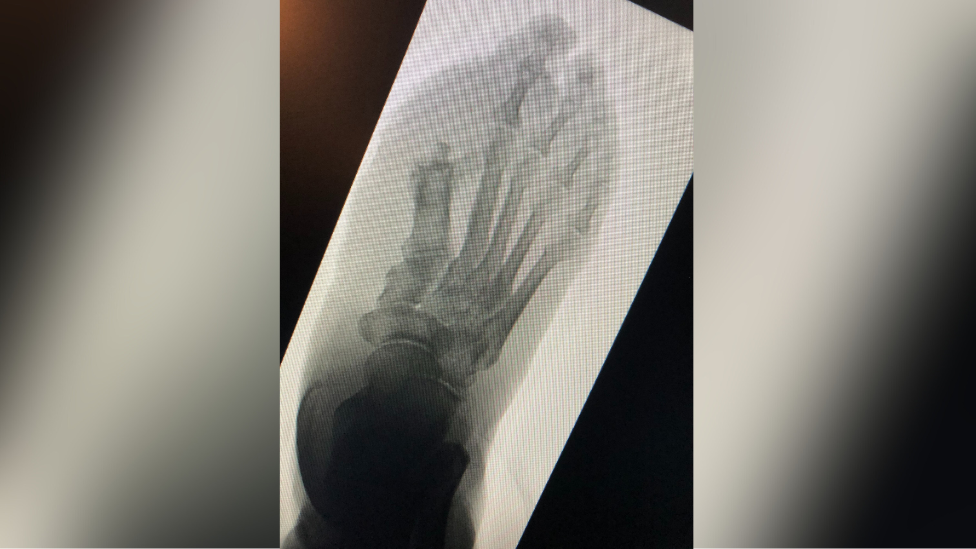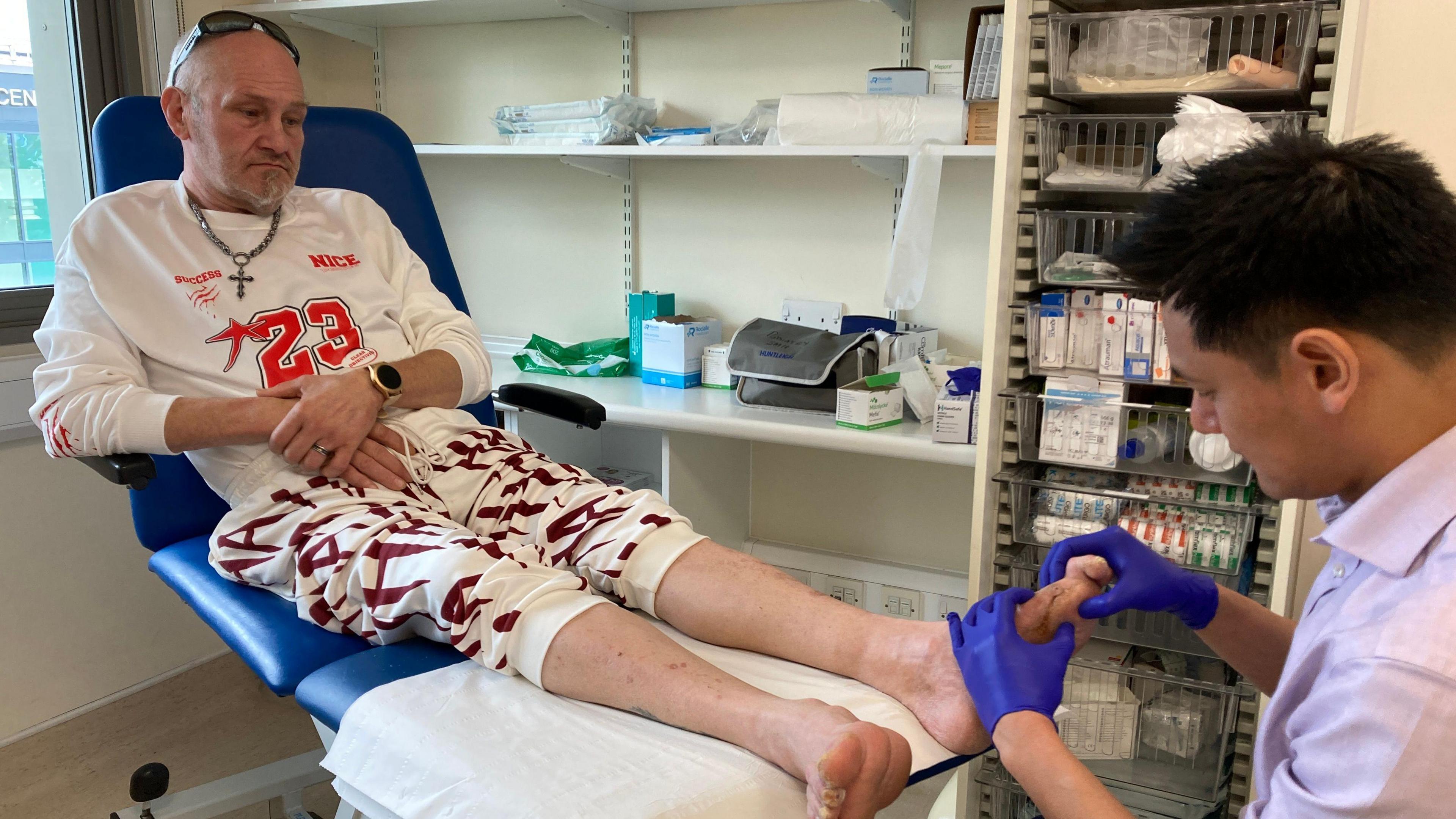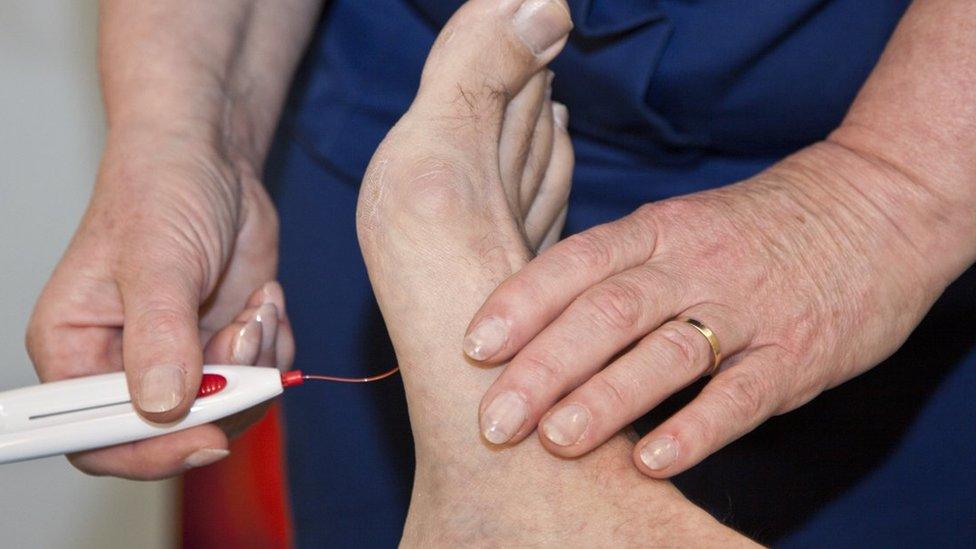Plastic surgery key to avoiding amputations - surgeon

James Chan hopes to expand the use of plastic surgery techniques across the NHS
- Published
A hospital trust is one of only a handful in the country offering routine limb-saving plastic surgery for diabetic patients suffering from foot ulcers.
Diabetic foot ulcers affect more than 18 million people worldwide each year and costs the NHS in England more to treat than breast, prostate and lung cancer combined.
Staff at Stoke Mandeville Hospital in Aylesbury, Buckinghamshire, carry out a small number of operations each year to preserve patients' feet and avoid major amputation. James Chan, a consultant plastic surgeon, wants to see the technique expanded across the UK.
An NHS spokesperson said: "Major amputation incidence in England is now one of the lowest internationally, however a continued focus on reducing unwarranted variation in footcare outcomes is key ambition of the NHS."

It is estimated that one in three to one in five people with diabetes will develop a foot ulcer
'Good success rates'
As part of his role at the British Association of Plastic and Reconstructive and Aesthetic Surgeons, Mr Chan has been trying to engage with more surgeons around the country to make the procedure more widely available.
"These techniques are relatively newly discovered," he said.
"In other countries like Taiwan, or Korea or in the United States they've started doing this over the last few years and found good success rates and that's why we're starting to adopt this in the UK," Mr Chan said.
The procedure involves cleaning out the infected wound then transplanting a healthy bit of skin, muscle or bone down to the foot.
More than five million people in the UK live with diabetes, it is estimated that one in three to one in five of them will develop a diabetic foot ulcer at some point.

Mr Chan attends podiatry clinics to assess whether diabetic patients would benefit from plastic surgery if a foot ulcer is not healing
When diabetes - both type 1 and type 2 - is present for many years, especially if it is poorly controlled, it can cause complications such as reducing blood flow to vessels in the feet and nerve damage which can reduce sensation. This increases the risk of ulcers and infections which may lead to amputation.
"Now more and more people in their 30s and 40s are getting this and they have ulcers that just don't heal and go on for years on end and ultimately can lead to an amputation," said Mr Chan.
According to the National Institute for Health and Care Excellence, nearly 8,000 diabetic patients in England had a below the knee amputation between 2017 and 2020.
It is estimated that diabetes costs the NHS more than £10bn a year - or 10% of its budget. This includes treatment of complications arising from the condition and out-patient appointments.
'Quality of life'
Staff at Stoke Mandeville Hospital carry out less than 10 reconstructive plastic surgeries on diabetic patients a year, but they plan to do more.
"From the cases we've done so far we've seen people are able to get back to work, get back on their feet and have a good quality of life afterwards," Mr Chan said.
"We've had young people who were hospitalised several times a year because of sepsis from the foot and now they're back to work and four years down the line they're still infection free," he added.

John Smith said his quality of life had improved since he had plastic surgery on his foot four years ago
John Smith, 54, from Great Missenden, Buckinghamshire, is a self-employed gardener with type 2 diabetes.
He has previously needed to take six months off work because of a foot ulcer.
It got so bad that he had his big toe amputated at the John Radcliffe Hospital in Oxford.
But after the wound would not heal, plastic surgeons at Stoke Mandeville Hospital took a skin flap from his thigh and attached it to his foot.
Four years on and he is still infection free and able to work.
He said: "[I] still climb ladders, do my work, drive alright, ride my push bike, walk alright on it, everything....really it's improved a lot."
Diabetes UK said regular foot checks can help reduce the risk of foot amputations for people living with the condition and should be carried out by trained health professionals once a year, or more often if identified as high risk.
Phaedra Perry, the head of Diabetes UK south west and south central, said: "Amputations can have a devastating impact on people’s lives so it’s vital that healthcare professionals and people living with diabetes prioritise their foot health.”
NHS England said the percentage of people who receive all the checks for diabetes care in England had returned to pre-pandemic levels and an additional £36m had been provided to help restore services.
An NHS spokesperson, said: "Evidence shows that quality foot care supports reduced minor and major amputations, diabetic complications, hospital admissions, length of stay and improved patient experience.
“Meanwhile, major amputation incidence in England is now one of the lowest internationally, however a continued focus on reducing unwarranted variation in footcare outcomes is a key ambition of the NHS."
Follow Beds, Herts and Bucks news on Facebook, external, Instagram, external and X, external. Got a story? Email eastofenglandnews@bbc.co.uk, external or WhatsApp us on 0800 169 1830
- Published27 April 2022

- Published19 September 2019

- Published25 April 2012